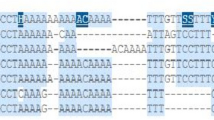Abstract
Growing evidence has indicated that lysyl oxidase (LOX) G473A polymorphism (rs1800449) is associated with cancer risk among Asians. However, results of single center and small sample study lack enough power. We first investigated the effect of LOX G473A polymorphism on cancer risk among Asians by a meta-analysis, and then further validated this association by a case–control study of colorectal cancer (CRC) with LOX G473A polymorphism in a Chinese population. STATA 12.0 software was used for the meta-analysis. The relationships were evaluated by calculating the pooled odds ratios (ORs) and their 95 % confidence intervals (CIs). In a case–control study comprising 577 CRC patients and 696 controls, LOX G473A polymorphism was detected by polymerase chain reaction–restriction fragment length polymorphism (PCR–RFLP) method. Logistic regression was used to evaluate genetic associations with the occurrence of CRC. The results of our meta-analysis, including seven case–control studies with a total of 2,377 cancer patients and 2,499 controls, suggested that LOX G473A polymorphism might be associated with an increased risk of cancer among Asians. In addition, results of a case–control study indicated that individuals with the AA or AG genotype had a significantly increased susceptibility to CRC occurrence, compared with individuals who had GG genotype. Overall, this meta-analysis and case–control study of CRC observed convincing association of LOX G473A polymorphism with cancer risk in Asians; our study would contribute to complete elucidation of carcinogenesis.




Similar content being viewed by others
References
Baker AM, Cox TR, Bird D, Lang G, Murray GI, Sun XF et al (2011) The role of lysyl oxidase in SRC-dependent proliferation and metastasis of colorectal cancer. J Natl Cancer Inst 103:407–424
Gao X, Duan H, Zhu Z (2013) Association between PTEN IVS4 polymorphism and cancer risk: a meta-analysis. Cancer Biomark 13:465–470
Hämäläinen ER, Jones TA, Sheer D, Taskinen K, Pihlajaniemi T, Kivirikko KI (1991) Molecular cloning of human lysyl oxidase and assignment of the gene to chromosome 5q23.3-31.2. Genomics 11:508–516
Han S, Feng S, Yuan G, Dong T, Gao D, Liang G et al (2014) Lysyl oxidase genetic variants and the prognosis of glioma. APMIS. 122:200–205
Liu Y, Lv B, He Z, Zhou Y, Han C, Shi G et al (2012) Lysyl oxidase polymorphisms and susceptibility to osteosarcoma. PLoS One 7:e41610
Nagaraja GM, Othman M, Fox BP, Alsaber R, Pellegrino CM, Zeng Y et al (2006) Gene expression signatures and biomarkers of noninvasive and invasive breast cancer cells: comprehensive profiles by representational difference analysis, microarrays and proteomics. Oncogene 25:2328–2338
Ren J, Wu X, He W, Shao J, Cheng B, Huang T (2011) Lysyl oxidase 473 G>A polymorphism and breast cancer susceptibility in Chinese Han population. DNA Cell Biol 30:111–116
Schottenfeld D, Beebe-Dimmer JL (2005) Advances in cancer epidemiology: understanding causal mechanisms and the evidence for implementing interventions. Annu Rev Public Health 26:37–60
Shi W, Yang B, Li X, Sun S, Wang L, Jiao S (2012) The effect of lysyl oxidase polymorphism on susceptibility and prognosis of nonsmall cell lung cancer. Tumour Biol 33:2379–2383
Siegel R, Ma J, Zou Z, Jemal A (2014) Cancer statistics, 2014. CA Cancer J Clin 64:9–29
Walsh PS, Metzger DA, Higuchi R (1991) Chelex 100 as a medium for simple extraction of DNA for PCR-based typing from forensic material. Biotechniques 10:506–513
Wang X, Cong JL, Qu LY, Jiang L, Wang Y (2012) Association between lysyl oxidase G473A polymorphism and ovarian cancer in the Han Chinese population. J Int Med Res 40:917–923
Wu J, Cai C, Tong D, Hou H (2012) Lysyl oxidase G473A polymorphism is associated with increased risk of ovarian cancer. Genet Test Mol Biomarkers 16:915–919
Ying H, Wang J, Gao X (2014) CCL5-403, CCR5-59029, and Delta32 polymorphisms and cancer risk: a meta-analysis based on 20,625 subjects. Tumour Biol 35(6):5895–5904
Yoon JH, Park JK, Kang YH, Park YK, Nam SW, Lee JY et al (2011) Lysyl oxidase G473A polymorphism is closely associated with susceptibility to gastric cancer in a South Korean population. APMIS 119:762–768
Author information
Authors and Affiliations
Corresponding author
Additional information
Communicated by S. Hohmann.
X. Gao and S. Zhang have contributed equally to this work.
Rights and permissions
About this article
Cite this article
Gao, X., Zhang, S. & Zhu, Z. Lysyl oxidase rs1800449 polymorphism and cancer risk among Asians: evidence from a meta-analysis and a case–control study of colorectal cancer. Mol Genet Genomics 290, 23–28 (2015). https://doi.org/10.1007/s00438-014-0896-3
Received:
Accepted:
Published:
Issue Date:
DOI: https://doi.org/10.1007/s00438-014-0896-3




